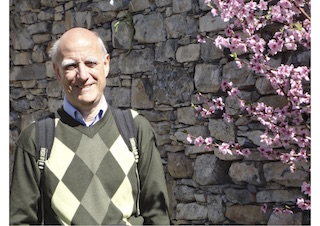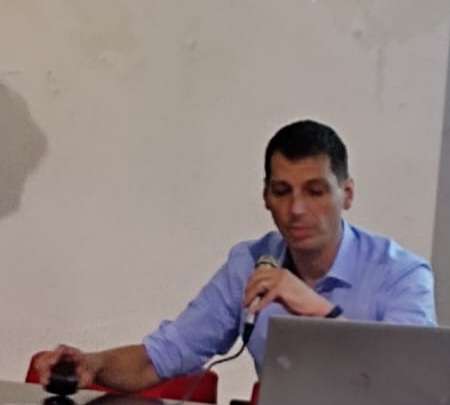Studiare
In questa sezione è possibile reperire le informazioni riguardanti l'organizzazione pratica del corso, lo svolgimento delle attività didattiche, le opportunità formative e i contatti utili durante tutto il percorso di studi, fino al conseguimento del titolo finale.
Calendario accademico
Il calendario accademico riporta le scadenze, gli adempimenti e i periodi rilevanti per la componente studentesca, personale docente e personale dell'Università. Sono inoltre indicate le festività e le chiusure ufficiali dell'Ateneo.
L’anno accademico inizia il 1° ottobre e termina il 30 settembre dell'anno successivo.
Calendario didattico
Il calendario didattico indica i periodi di svolgimento delle attività formative, di sessioni d'esami, di laurea e di chiusura per le festività.
| Periodo | Dal | Al |
|---|---|---|
| Semestrino IA | 28-set-2015 | 14-nov-2015 |
| Semestrino IB | 16-nov-2015 | 16-gen-2016 |
| Semestrino IIA | 22-feb-2016 | 16-apr-2016 |
| Semestrino IIB | 18-apr-2016 | 4-giu-2016 |
| Sessione | Dal | Al |
|---|---|---|
| Sessione invernale | 18-gen-2016 | 20-feb-2016 |
| Sessione estiva | 6-giu-2016 | 30-lug-2016 |
| Sessione autunnale | 1-set-2016 | 30-set-2016 |
| Sessione | Dal | Al |
|---|---|---|
| Sessione estiva | 5-lug-2016 | 6-lug-2016 |
| Sessione autunnale | 22-nov-2016 | 23-nov-2016 |
| Sessione invernale | 3-apr-2017 | 8-apr-2017 |
| Periodo | Dal | Al |
|---|---|---|
| Festa di Ognissanti | 1-nov-2015 | 1-nov-2015 |
| Festa dell'Immacolata | 8-dic-2015 | 8-dic-2015 |
| Vacanze di Natale | 23-dic-2015 | 6-gen-2016 |
| Vancanze di Pasqua | 24-mar-2016 | 29-mar-2016 |
| Festa della Liberazione | 25-apr-2016 | 25-apr-2016 |
| Festa dei Lavoratori | 1-mag-2016 | 1-mag-2016 |
| Festa del S. Patrono S. Zeno | 21-mag-2016 | 21-mag-2016 |
| Festa della Repubblica | 2-giu-2016 | 2-giu-2016 |
| Vacanze estive | 8-ago-2016 | 15-ago-2016 |
Calendario esami
Gli appelli d'esame sono gestiti dalla Unità Operativa Segreteria Corsi di Studio Culture e Civiltà.
Per consultazione e iscrizione agli appelli d'esame visita il sistema ESSE3.
Per problemi inerenti allo smarrimento della password di accesso ai servizi on-line si prega di rivolgersi al supporto informatico della Scuola o al servizio recupero credenziali
Per dubbi o domande leggi le risposte alle domande più frequenti F.A.Q. Iscrizione Esami
Docenti

Avezzu' Guido
 guido.avezzu@univr.it
guido.avezzu@univr.it
 augusto.barbi@univr.it
augusto.barbi@univr.it

Bassetti Massimiliano
 massimiliano.bassetti@univr.it
massimiliano.bassetti@univr.it
 045802 8376
045802 8376
 lorenzo.carpane@univr.it
lorenzo.carpane@univr.it
 alberto.cavarzere@univr.it
alberto.cavarzere@univr.it
 daniela.ceoletta@univr.it
daniela.ceoletta@univr.it

Chiecchi Giuseppe
 giuseppe.chiecchi@univr.it
giuseppe.chiecchi@univr.it
 +39 045802 8117
+39 045802 8117

Mastrocinque Attilio
 attilio.mastrocinque@univr.it
attilio.mastrocinque@univr.it
 +39 045802 8386
+39 045802 8386
 silvia.monti@univr.it
silvia.monti@univr.it
 linda.napolitano@univr.it
linda.napolitano@univr.it

Pasini Roberto
 pasini.roberto@univr.it
pasini.roberto@univr.it
 +39 045802 8121
+39 045802 8121
Peresani Marco
 dino.piovan@univr.it
dino.piovan@univr.it
 alberto.scandola@univr.it
alberto.scandola@univr.it
Tani Stefano
 stefano.tani@univr.it
stefano.tani@univr.it
 +39 045802 8110
+39 045802 8110
 gianmaria.varanini@univr.it
gianmaria.varanini@univr.it

Zaccarello Michelangelo
 michelangelo.zaccarello@univr.it
michelangelo.zaccarello@univr.it
 +39 045 802 8330
+39 045 802 8330
Piano Didattico
Il piano didattico è l'elenco degli insegnamenti e delle altre attività formative che devono essere sostenute nel corso della propria carriera universitaria.
Selezionare il piano didattico in base all'anno accademico di iscrizione.
1° Anno
| Insegnamenti | Crediti | TAF | SSD |
|---|
2° Anno Attivato nell'A.A. 2016/2017
| Insegnamenti | Crediti | TAF | SSD |
|---|
Letteratura latina (i)
3° Anno Attivato nell'A.A. 2017/2018
| Insegnamenti | Crediti | TAF | SSD |
|---|
| Insegnamenti | Crediti | TAF | SSD |
|---|
| Insegnamenti | Crediti | TAF | SSD |
|---|
Letteratura latina (i)
| Insegnamenti | Crediti | TAF | SSD |
|---|
| Insegnamenti | Crediti | TAF | SSD |
|---|
Legenda | Tipo Attività Formativa (TAF)
TAF (Tipologia Attività Formativa) Tutti gli insegnamenti e le attività sono classificate in diversi tipi di attività formativa, indicati da una lettera.
Tipologia di Attività formativa D e F
Insegnamenti non ancora inseriti
Prospettive
Avvisi degli insegnamenti e del corso di studio
Per la comunità studentesca
Se sei già iscritta/o a un corso di studio, puoi consultare tutti gli avvisi relativi al tuo corso di studi nella tua area riservata MyUnivr.
In questo portale potrai visualizzare informazioni, risorse e servizi utili che riguardano la tua carriera universitaria (libretto online, gestione della carriera Esse3, corsi e-learning, email istituzionale, modulistica di segreteria, procedure amministrative, ecc.).
Entra in MyUnivr con le tue credenziali GIA: solo così potrai ricevere notifica di tutti gli avvisi dei tuoi docenti e della tua segreteria via mail e a breve anche tramite l'app Univr.
Prova finale
(a) La prova finale per il conseguimento del titolo consiste nella discussione di un elaborato scritto, di circa 30 cartelle di 2500 battute, su un argomento concordato con il/la relatore/trice. Alla prova finale sono riservati 6 (sei) CFU.
(b) La decisione di voto avviene senza la presenza dello/a studente/essa o di estranei/e. La Commissione dispone di centodieci punti; il voto minimo per il superamento dell’esame è di 66/110. Alla prova finale è attribuito il punteggio massimo di cinque/110.
(c) Il Collegio Didattico del Corso di laurea incentiva il compimento degli studi nella durata normale del corso (ovvero nella durata concordata, per gli/le studenti/esse a tempo parziale) assegnando un punto su 110 aggiuntivo a chi si laurei nelle sessioni dell’ultimo anno di corso. Ai soli effetti di questa incentivazione, agli/alle studenti/esse che abbiano trascorso un periodo di studio all’estero nel quadro degli scambi promossi dall’Ateneo, la durata del corso di studi normale è incrementata della durata del periodo trascorso all’estero. Se uno/a studente/essa ha speso all’estero un periodo di studio entro il quadro di un accordo Erasmus, viene aggiunto 1 punto su 110 alla media pesata.
(d) Quando il/la candidato/a abbia ottenuto il massimo dei voti, può essere concessa la lode purché con decisione unanime.
(e) L’elaborato scritto, oggetto della prova finale, può essere redatto in lingua diversa dall’Italiano, previa approvazione del/della relatore/trice e del/della Presidente del Collegio Didattico. La discussione deve comunque essere condotta in Italiano.
L’elaborato scritto verrà caricato on line dal/dalla candidato/a e dovrà essere approvato dal/dalla relatore/trice prima della sua discussione.
Le discussioni dell’elaborato finale avvengono davanti a sottocommissioni di almeno tre membri, dei quali uno sarà il/la relatore/trice, uno il/la correlatore/trice, il terzo un altro/a docente dell’Ateneo oppure un esperto/a esterno/a nominato/a dal Presidente del Collegio didattico. La discussione si svolgerà nei giorni precedenti la proclamazione in data concordata dai/dalle componenti la sottocommissione. Il risultato della discussione e la proposta di valutazione saranno tempestivamente comunicati dal/dalla Presidente della sottocommissione al/alla Presidente della Commissione per la prova finale.
La Commissione per la prova finale procederà alla valutazione, tenendo conto della proposta delle sottocommissioni, alla proclamazione e alla comunicazione del voto di laurea. La verbalizzazione, da compilarsi secondo la procedura denominata “firma digitale”, sarà responsabilità del/della Presidente della Commissione.
La commissione, constatato il valore insufficiente dell’elaborato, lo può ricusare: in tal caso lo/la studente/essa dovrà migliorare l'elaborato o comporne uno diverso, presentandosi ad una successiva sessione di laurea.
Lo/la studente/essa può ritirarsi dall’esame finale fino al momento di essere congedato dal/dalla Presidente della Commissione per dare corso alla decisione di voto.
Per gli studenti del Corso di laurea in Lettere, l'Esame di laurea si svolge in due momenti distinti:
- la discussione dell’elaborato finale, durante le due settimane precedenti la proclamazione;
- la proclamazione di laurea, in un giorno del periodo previsto dal calendario didattico per l'Esame di laurea.
N.B. Può essere relatore di elaborati per il conseguimento del titolo ogni docente che faccia parte del Collegio didattico di Beni culturali, Lettere e Tradizione e interpretazione dei testi letterari, purché lo studente abbia superato durante il corso di studio un esame in una disciplina del settore scientifico-disciplinare di afferenza del docente stesso.
Adempimenti amministrativi e scadenze domanda di laurea
Calendari discussione e proclamazione di laurea
Elenco delle proposte di tesi e stage
| Proposte di tesi | Area di ricerca |
|---|---|
| tesi di Glottologia, Storia comparata, Linguistica storica | ENGLISH LANGUAGE - Grammar and Syntax – Grammatik und Syntax |
| tesi di Glottologia, Storia comparata, Linguistica storica | GERMANIC LANGUAGE - Dialectology - Dialektologie |
| tesi di Glottologia, Storia comparata, Linguistica storica | HUMANITIES & SOCIAL STUDIES - HUMANITIES & SOCIAL STUDIES |
| tesi di Glottologia, Storia comparata, Linguistica storica | Indo-European languages & literatures - Indo-European languages & literatures |
| tesi di Glottologia, Storia comparata, Linguistica storica | LINGUISTICS - LINGUISTICS |
| Stage | Area di ricerca |
|---|---|
| Lavorare in archivio | Argomenti vari |
| L'iter del libro in biblioteca | Argomenti vari |
Gestione carriere
Esercitazioni Linguistiche CLA
Tutorato per studenti
Tutti i docenti del Corso di Studio possono fornire nell'orario di ricevimento una forma di tutorato volta ad orientare e assistere gli studenti lungo tutto il corso degli studi.Requisiti classi di abilitazione insegnamento
Requisiti necessari per accedere alle classi di abilitazione per l'insegnamento.
vedi allegato pdf
Inoltre, per informazioni sui 24 CFU nelle discipline antropo-psico-pedagogiche e nelle metodologie e tecnologie didattiche, si veda -> LINK
Documenti
| Titolo | Info File |
|---|---|
|
|
pdf, it, 307 KB, 30/11/21 |










































